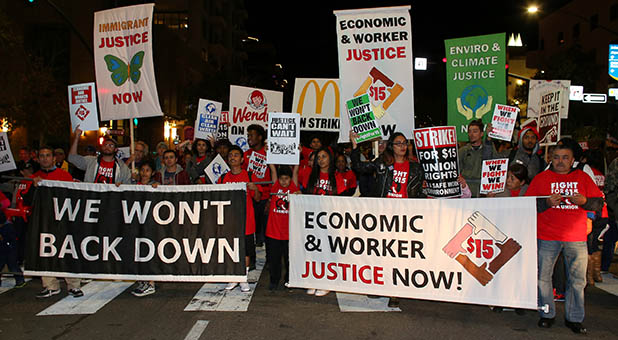As protests for a $15-per-hour minimum wage continue to rage across the country, cities like Seattle and states like California and New York have already begun to adopt such schemes.
But alas, prices are not play things, and such measures are bound to reap a range of deleterious effects, from raised consumer prices to increased unemployment to reduced working hours to outright business closures. Contrary to the popular narrative, those consequences tend to hit small businesses and less-skilled workers first and hardest.
With the recent laws, the destruction has already begun. To illustrate the damage thus far, the Employment Policies Institute is cataloging hundreds of stories on its Faces of $15 website, including a range of videos highlighting the frustrations and responses of business owners, employees and faithful customers alike.
In the following five case studies, we see but a glimpse of the minimum wage’s cramping effect on human enterprise, creative service and economic diversity.
1. Abbot’s Cellar
For Abbot’s Cellar, a newly founded restaurant in San Francisco, the recent wage hike made their start-up model unfeasible, even despite tremendous initial success. “How are businesses that have practically no margins as is—mom and pops, small businesses—how are they supposed to just absorb that?” asks Nat Cutler, one of the owners.
“San Francisco is a city that seems like it’s supposed to be built on a Bohemian, small-business, mom-and-pop-type vibe,” he continues. “That’s the culture of the city. I worry that the type of change that’s happening is going to take away from the great culture that was here. … I wish a little more thought would be put into the long-term impact.”
2. Del Rio Diner
“Running a diner is not easy,” says Larry, owner of Del Rio Diner in Brooklyn, NY. “Everyone thinks it is, but it’s not.” The neighborhood diner has a 40-year history in the community with a strong and loyal customer base, but amid mounting food costs and a tough economic environment, New York’s mandatory wage increase was “the straw that broke the camel’s back,” according to Larry:
“I’m not saying they [the workers] don’t deserve it. Everybody deserves it,” Larry says. “It’s just that I can’t afford to pay it. … This is a diner. It’s a neighborhood, middle-class, hardworking area. People come in. They’re on fixed incomes. This economy, especially the city of New York, doesn’t warrant this business model anymore.”
3. Almost Perfect Bookstore
Almost Perfect Bookstore once called itself “one of the largest new and used book stores on the West Coast.” Now, thanks to the $15 minimum wage, the 25-year-old store in Sacramento is closing, with the owner shifting to an online-only presence. “The reason that this particular business … is going out of business is because I can no longer afford to pay the ever-increasing minimum wage,” says owner Kelly Uimer.
Regular employees had previously been entitled to a share of the store’s profits. After the wage change, however, profits dried up and employees received even less than before. “As the minimum wage increased, the profits decreased and became zero,” Uimer explains. “My employees actually made more money per week at $8 per hour than $10 per hour, because I had actual money to give them.”
4. Sterling’s Family Childcare
Sterling’s Family Childcare offers childcare for children in Oakland, California, 98 percent of which come from low-income families. Due to the recent California law, the owner has had to lay off one longstanding employee, cut employee hours, and turn away children who required transportation.
“This wage increase has not only hurt the employees,” says Muriel Sterling, the owner. “It has hurt the families and the children.”
5. ARGYLEHaus of Apparel
Foreseeing the long-term impacts of California’s wage increases, Houman Salem decided to move his clothing business, ARGYLEHaus of Apparel, from San Fernando to Las Vegas, Nevada. “If not for the increase in minimum wage, there’d be zero interest on my part to go anywhere else,” he says. “My roots are here. My family’s here. Everybody I know in the world is right here.”
Salem is trying to manufacture the company’s clothes in America, but that task is getting harder and harder. “At a time in which the demand [for American made apparel] is at its highest that it’s probably ever been, California has put up the ‘going out of business’ sign,” Salem says. “It’s a tragedy. It’s a massive tragedy.” {eoa}
Joseph Sunde is a writer and project coordinator for the Acton Institute, serving as editor of the Letters to the Exiles blog and content manager of the Oikonomia channel at Patheos.com. He is the founder of Remnant Culture and was a longtime contributor to AEI’s Values & Capitalism project.
This article was originally published at acton.org. Used with permission.
See an error in this article?
To contact us or to submit an article






















